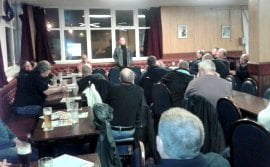The Shetlands, the most northerly point of the British Isles, was battered over the past week by high seas and storms. This however did not prevent successful meetings, called by the Laggan Tomore Construction branch of UNITE to discuss blacklisting and other political issues, from taking place. These meetings were addressed by Dave Smith from the Blacklist Support Group and Rob Sewell, editor of Socialist Appeal.
The Shetlands, the most northerly point of the British Isles, 100 miles from the mainland, was battered over the past week by high seas and storms. This however did not prevent successful meetings, called by the Laggan Tomore Construction branch of UNITE to discuss blacklisting and other political issues, from taking place. These meetings were addressed by Dave Smith from the Blacklist Support Group and Rob Sewell, editor of Socialist Appeal and author of the History of British Trade Unions.
The first meeting took place at the Sella Ness camp, where construction workers involved in the Shetland Gas Plant project were accommodated. We met with about 20 workers, shop stewards and branch officials from UNITE and the GMB.
Brother Dave Smith outlined the scandal of blacklisting which has blighted the lives of so many workers, especially in the construction industry. The campaign had hit the headlines in 2009, when the Information Commissioner’s Office, following a tip off, raided the outfit called the Consulting Association. There they discovered secret files on 3,200 people, many of which were obtained from the police or Special Branch. Dave not only showed his own file of many pages, but also of workers in the meeting, unaware that the name was on the list.
As the list was passed around, workers were shocked as they recognised not only their own names but also of friends and other fellow workers. Dave explained that although the issue was being raised in the courts and in Parliament, “it was primarily down to the rank and file to fight this scandal.”
Rob Sewell’s contribution centred not only on blacklisting and victimisation, which had been going on for more than 200 years, but the whole conspiracy against the working class. “The ruling class has always tried to ban, stigmatise and crush all resistance to its power”, explained Rob. “The whole thrust of big business is to secure their domination.”
Rob went on to outline the attacks on the workers, especially in this period of capitalist crisis. For workers to defend themselves, they needed fighting organisations and a fighting leadership. Unfortunately, the trade union leaders were living in the past, hoping things will get better. We needed a movement that would not pander to capitalism but do away with it.
These ideas found a ready response, with many workers expressing their anger at the employers and the way they were treated.
The discussion was wide ranging, but tended to focus in on the need for democratic accountability in the trade unions, with the regular election of trade union leaders as with the election of shop stewards. “If a trade union general secretary lived on the same pay as the members, they would fights damned sight harder for a wage rise”, explained Rob to the delight of the audience.
Workers were keen to get material on blacklisting and buy copies of Socialist Appeal and Rob’s book on the history of trade unions, which quickly sold out. We met also with other workers in the Shetlands who were interested in helping to build the IMT. This is truly a historic occasion!
This UNITE workplace branch in the Shetlands had been built from scratch and now had nearly 1,000 members. It is a testimony to the work of these comrades. It shows the potential for union organisation. But it also shows the thirst amongst ordinary workers for ideas that challenge capitalism and offer a real socialist alternative to the situation they faced.






